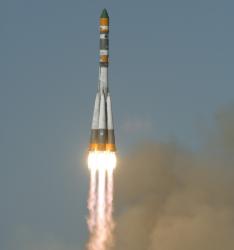
Would you know microbial life if you saw it? What if you were a robot? A newly developed "Life Marker Chip" might give future robotic explorers a tool they can use to know if the rock, sand, water or ice they're examining contains life. This device, as well as a few dozen other experiments recently headed to space aboard the Foton microgravity mission.
The unmanned Soyuz-U launcher blasted off from the Kaikonur Cosmodrome, Kazakhstan on September 14th. 9 minutes after launch, the Foton-M3 spacecraft separated from the rocket's upper stage, and went into an orbit that takes it around the Earth every 90 minutes.
The spacecraft is carrying a payload of 43 experiments designed to test the effects of microgravity and radiation. The experiments include fluid physics, biology, protein crystal growth, meteoritics, radiation dosimetry and exobiology. And one interesting member of the mission is the Life Marker Chip.
The nickname for the Life Marker Chip is the Mars pregnancy test since it works on the same principle. It contains a tray of very specific proteins, each of which acts like a plug. If microbial life is present on Mars, some of its protein molecules will come into contact with the LMC, and then bond, like a very specific puzzle piece. This will allow the robot to not only report on evidence of life, but give very specific information about what kind of life process is being observed.
The trip to space on board the Foton is just a test. Scientists want to see what happens to the experiment when it's exposed to the radiation and microgravity of being in orbit. The experiment, as well as the other 40ish experiments on board the capsule will be recovered when the capsule returns to Earth on September 25th.
If everything works properly, the Life Marker Chip will be installed onto ESA's ExoMars mission; a rover that will blast off for the Red Planet in 2013. Maybe then we'll get the answer we're hoping for: Mars is pregnant… with life.
Original Source: Carnegie Institution News Release



No comments:
Post a Comment